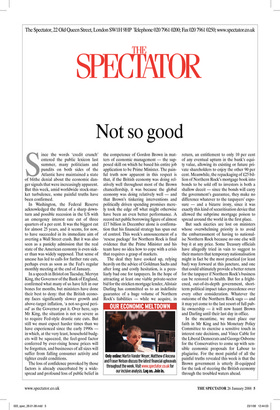Not so good
Since the words ‘credit crunch’ entered the public lexicon last summer, many politicians and pundits on both sides of the Atlantic have maintained a state of blithe denial about the economic danger signals that were increasingly apparent. But this week, amid worldwide stock-market turbulence, some painful truths have been confirmed.
In Washington, the Federal Reserve acknowledged the threat of a sharp downturn and possible recession in the US with an emergency interest rate cut of three quarters of a per cent. It was the biggest cut for almost 25 years, and it seems, for now, to have succeeded in its immediate aim of averting a Wall Street crash. But it was also seen as a panicky admission that the real state of the American economy is even sicker than was widely supposed. That sense of unease has led to calls for further rate cuts, perhaps even as soon as the Fed’s regular monthly meeting at the end of January.
In a speech in Bristol on Tuesday, Mervyn King, the Governor of the Bank of England, confirmed what many of us have felt in our bones for months, but ministers have done their best to deny: that the British economy faces significantly slower growth and above-target inflation, ‘a not-so-good period’ as the Governor put it. Over here, says Mr King, the situation is not so severe as to require Fed-style drastic rate cuts. But still we must expect harder times than we have experienced since the early 1990s — in which, at the very least, household budgets will be squeezed, the feel-good factor conferred by ever-rising house prices will be forgotten, and businesses of all sizes will suffer from falling consumer activity and tighter credit conditions.
The loss of confidence provoked by those factors is already exacerbated by a widespread and profound loss of public belief in the competence of Gordon Brown in matters of economic management — the supposed skill on which he based his entire job application to be Prime Minister. The painful truth now apparent in this respect is that, if the British economy was doing relatively well throughout most of the Brown chancellorship, it was because the global economy was doing relatively well — and that Brown’s tinkering interventions and politically driven spending promises merely took the edge off what might otherwise have been an even better performance. A record net public borrowing figure of almost £17 billion in December alone is confirmation that his financial strategy has spun out of control. This week’s announcement of a ‘rescue package’ for Northern Rock is final evidence that the Prime Minister and his team have no idea how to cope with a crisis that requires a grasp of markets.
The deal they have cooked up, relying heavily on the advice of Goldman Sachs and after long and costly hesitation, is a peculiarly bad one for taxpayers. In the hope of attracting at least one viable private-sector bid for the stricken mortgage lender, Alistair Darling has committed us to an indefinite guarantee of a huge volume of Northern Rock’s liabilities — while we acquire, in return, an entitlement to only 10 per cent of any eventual upturn in the bank’s equity value, allowing its existing or future private shareholders to enjoy the other 90 per cent. Meanwhile, the repackaging of £25 billion of Northern Rock’s mortgage book into bonds to be sold off to investors is both a shallow deceit — since the bonds will carry the government’s guarantee, they make no difference whatever to the taxpayers’ exposure — and a bizarre irony, since it was exactly this kind of securitisation device that allowed the subprime mortgage poison to spread around the world in the first place.
But such niceties are lost on ministers whose overwhelming priority is to avoid the embarrassment of having to nationalise Northern Rock because no one else will buy it at any price. Some Treasury officials have allegedly tried in vain to suggest to their masters that temporary nationalisation might in fact be the most practical (or least bad) way forward at this juncture, and one that could ultimately provide a better return for the taxpayer if Northern Rock’s business can be restored to health. But for a frightened, out-of-its-depth government, shortterm political impact takes precedence over every other consideration. Whatever the outcome of the Northern Rock saga — and it may yet come to the last resort of full public ownership — it will now haunt Brown and Darling until their last day in office.
In the meantime, we must place our faith in Mr King and his Monetary Policy Committee to exercise a sensitive touch in interest rate decisions, and Vince Cable for the Liberal Democrats and George Osborne for the Conservatives to come up with sensible economic proposals for Labour to plagiarise. For the most painful of all the painful truths revealed this week is that the Brown government is utterly ill-equipped for the task of steering the British economy through the troubled waters ahead.










































































 Previous page
Previous page